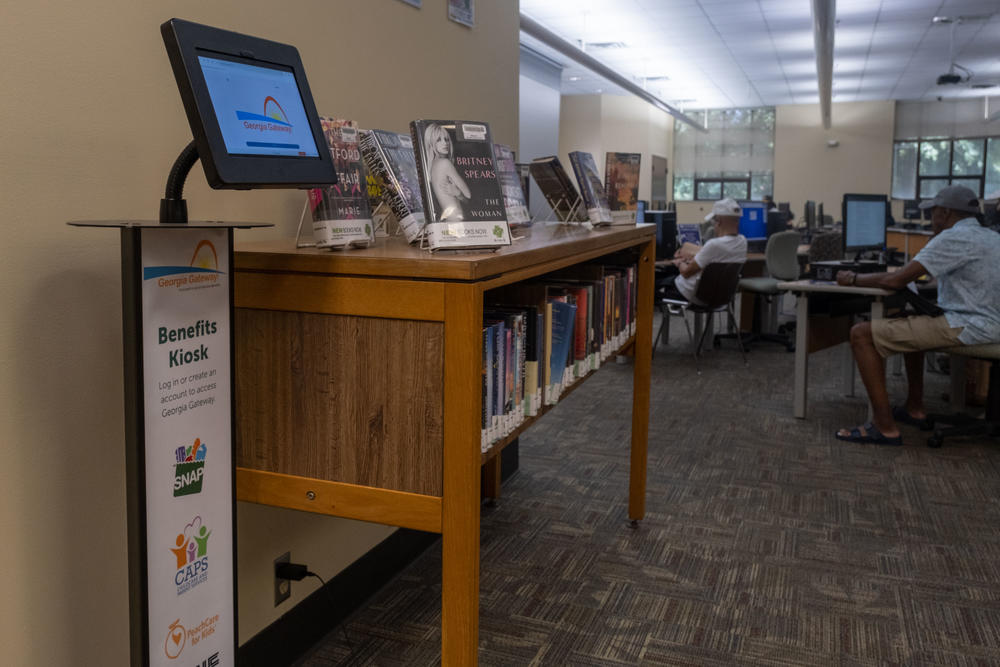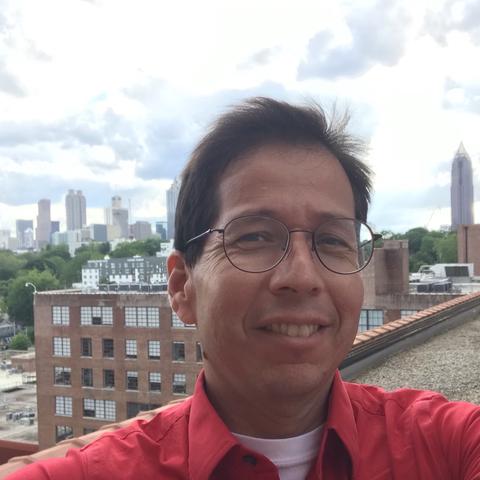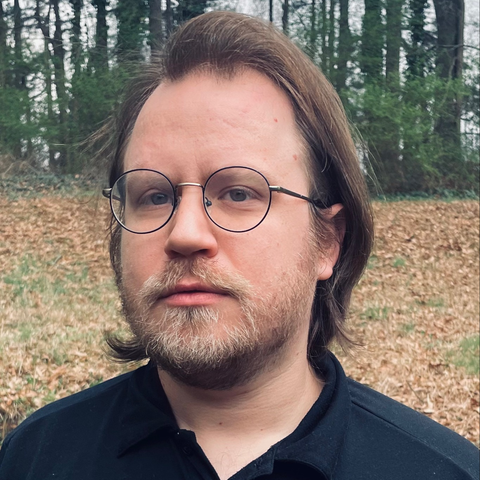
Section Branding
Header Content
Georgia Today: Court to hear arguments against Willis; Library kiosks for Georgia Gateway
Primary Content
LISTEN: On the Wednesday, May 8 edition of Georgia Today: A Georgia court will hear arguments over whether Fulton County DA Fani Willis should be removed from the Trump election interference case; self-service kiosks at public libraries make it easier for Georgians to access state financial benefits; and a rediscovered African American cemetery in Penfield, Ga., reveals new details about Mercer University.

Orlando Montoya: Hello and welcome to the Georgia Today podcast from GPB News. Today is Wednesday, May 8. I'm Orlando Montoya. On today's episode: a Georgia court will hear arguments over whether Fulton County District Attorney Fani Willis should be removed from the Trump election interference case. Self-service kiosks at public libraries make it easier for Georgians to access state financial benefits, and a rediscovered African-American cemetery reveals new details about the history of Mercer University. These stories and more are coming up on this edition of Georgia Today.
Story 1:
Orlando Montoya: A Georgia appeals court has agreed to review a lower court's ruling in the state's election interference case against former President Donald Trump. The Georgia Court of Appeals said today it would hear arguments over whether Fulton County District Attorney Fani Willis should be removed from the case. A lower court ruled in March that she could continue as lead prosecutor, despite a romantic relationship with a special prosecutor she hired on the case, who's since resigned. The review likely means a further delay in the case, and a greater possibility that it might not go to trial before the November election.

Story 2:
Orlando Montoya: Gov. Brian Kemp signed an elections bill into law today that some fear could allow more voter challenges. GPB's Sarah Kallis reports.
Sarah Kallis: Senate Bill 189 is a broad-sweeping elections bill. It outlines requirements for voter challenges, removes QR codes from ballots in 2026 and allows third party candidates to get on the ballot in Georgia as long as they are on at least 10 other states'. It also requires a physical address for all voters. CEO of voting rights group Verify, Lauren Groh-Wargo says the changes to the law are unnecessary.
Lauren Groh-Wargo: There's no basis on any reality for what needs to happen. There's no rampant voter fraud. There's no, you know, hugely inaccurate voter rolls. There's regular voter roll maintenance that happens.
Sarah Kallis: Supporters of the bill say it will help fortify election security. For GPB News, I'm Sarah Kalis in Atlanta.
Story 3:
Orlando Montoya: Gov. Brian Kemp has vetoed a bill that would have suspended the state's tax breaks for new data centers. Kemp says the bill would undermine investments in Georgia made by high tech companies. State lawmakers targeted the tax breaks this year because of the huge demand data centers place on the supply of electricity. Jeannette Gayer of Environment Georgia says the veto is disappointing.
Jeannette Gayer: We are increasing the pollution in the state. We are increasing what, you know, all ratepayers, bill payers are going to have to pay to help build that capacity.
Orlando Montoya: The bill was one of a dozen that Kemp struck down yesterday, the last day for him to either sign or veto bills. And we have more on what bills got the governor's signature or veto at GPB.org/news.

Story 4:
Orlando Montoya: Georgians now can apply for and manage critical state financial benefits at public libraries across Georgia. Self-service kiosks are expanding state access to the state's benefits portal, called Georgia Gateway. The program is managed by a partnership between Georgia's public libraries and the state Department of Human Services. GPB's Sofi Gratas has more.
Sofi Gratas: At Washington Memorial Library, the computer lab stays busy.
Jennifer Lautzenheiser: Libraries are a core access point for all sorts of things.
Sofi Gratas: So says Jennifer Lautzenheiser with Middle Georgia Regional Libraries. That includes logging into Medicaid and SNAP accounts through Gateway. In fact, enough people here have asked for help with Gateway that the library started a how-to class. Lautzenheiser says the new gateway kiosk, free to anyone, is more efficient.
Jennifer Lautzenheiser: So people can scan their documents, they can fill out their forms and do all of that on an easy touchscreen.
Sofi Gratas: About 300 libraries in more than 100 rural and urban counties received a kiosk through the rollout. Users will still need to contact DHS caseworkers with any benefits issues. For GPB News, I'm Sofi Gratas in Macon.
Story 5:
Orlando Montoya: A Macon moving company will have to pay a former employee about $136,000 over alleged racial and religious discrimination. The former employee, Gregory Lowe, sued his former workplace All Star Moving, claiming he was fired in 2019 after the company's owner made a string of insults because Lowe is Black and Muslim. The company never responded to the lawsuit in court, and a federal judge last week made a summary judgment in Lowe's favor.
Story 6:
Orlando Montoya: The head of Chatham County's public transit system, is leaving to join the city of Savannah as its first chief of planning and economic development. Chatham Area Transit CEO Faye DiMassimo will fill the newly created position next month, where she'll oversee seven departments, among them Savannah's Office of Tourism. The city said in a statement on Monday that the DiMassimo brings more than 40 years of experience in both the public and private sectors. The board of Chatham Area Transit met yesterday to discuss the search for its next executive director.
Story 7:
Orlando Montoya: A few years ago, a forgotten African American cemetery with ties to Macon's Mercer University was rediscovered about 80 miles away, where Mercer was founded. A lot has been learned at the Penfield Cemetery since then, but as GPB's Grant Blankenship explains, there's still much left to explain.
Grant Blankenship: Cicadas sing above a grove of magnolias and hardwoods as Maya Peters-Greno kneels over a small tombstone and cleans it. It was only a month ago when Peters-Greno, a history graduate student at the University of Georgia, first saw this headstone and dozens of others in the woods around her.
Maya Peters-Greno: We were just like — we didn't even know what to say. Like just our jaws were like.
Grant Blankenship: The understory is filled with royal blue pin flag's color complement to the deep green of the trees, each flag marking a spot where ground penetrating radar indicated a forgotten grave. But that's not the part that left Peters-Greno speechless.
Maya Peters-Greno: Well, I mean, first of all, that the wall — like the cemetery wall was built so late, I think. Because they said it was like 1940s, 1950s.
Grant Blankenship: What does it suggest to you that that wall was built so late?
Maya Peters-Greno: Oh, so much hatred, I think.
Grant Blankenship: The wall is low and red brick, separating the dead. On one side, a well-kept white cemetery where many of the founding generation of Macon's Mercer University and their kin rest on the other the graves of African-Americans dating back to the 1830s. The existence of this space was forgotten and unknown to people at Mercer, and even to those who grew up in nearby Greensboro until just a few years ago, when a white groundskeeper elected to pass the knowledge on before he died. Around the same time, a Mercer alumnus studying history in the Scotland graduate school found records describing how the then Mercer Institute was likely built by enslaved labor.
Spencer Roberts: Right. We have a sign in sheet. I've got, spare parts and stuff.
Grant Blankenship: Spencer Roberts leads digital initiatives at Emory's Pitts Theological Library and coordinates these volunteer cleanup days. He says he's here partly because Penfield might provide a model for Emory as it looks at its own history on its Oxford campus. Roberts says workers in Penfield are beginning to put a number on the burials in this 4-acre site.
Spencer Roberts: We think there are about 1,500.
Grant Blankenship: That's the high estimate. But over 1,000 burials have now been documented but unexplained.
Spencer Roberts: The numbers are just too high here to really explain, that number of people.
Grant Blankenship: So why are so many people buried here? Beginning in the 1830s, Mercer Institute was where the leaders of Georgia's white-hot plantation economy educated their sons. Mercer historian Doug Thompson says planners also loaned enslaved labor to the school.
Doug Thompson: We have, through census data in the 1850s, a recognition that there was a large enslaved population in Penfield. The cemetery is a confirmation of that.
Grant Blankenship: Spencer Roberts suspects when enslaved people from the nearby plantations died, planters saw burying them on Tillable land is bad business, so they might have thought:
Spencer Roberts: This land is not useful because it's too hilly. So let's all use that to bury the folks that we have enslaved in our plantations, which would make this a communal enslaved person's burial ground, which is a unique thing. They don't have many of those throughout the South.
Grant Blankenship: Mercer's Doug Thompson says burials continued here after slavery ended. They stopped in the 1950s after the wall went up..
Doug Thompson: So part of what we're having to work through is who made it go up.
Grant Blankenship: The effect seems clear for generations of Mercer University students, who annually day trip here for what's still called the Penfield pilgrimage.
Doug Thompson: We stop learning about the economic system that was undergirding the development of Penfield, which was slavery.
Grant Blankenship: You forget, which makes every grave found and tombstone cleaned...
Maya Peters-Greno: That's like so much better.
Grant Blankenship: ...an act of remembering. For GPB News, I'm Grant Blankenship in Penfield.
Story 8:
Orlando Montoya: Former Atlanta Symphony Orchestra music director Robert Spano returns to Atlanta this weekend for a two-week residency, starting tomorrow as part of concerts this weekend. Spano rejoins pianist Garrick Ohlsson for Rachmaninoff's Piano Concerto No. 3, a piece the two have collaborated on before. Spano told GPB's Sarah Zaslaw he's revisiting the piece because of Ohlsson's mastery of it.
Robert Spano: For me, his Rachmaninoff 3rd is the paradigm. It's just miraculous what he's able to do with that piece. I mean, it's one of those pieces that is notoriously difficult for the pianist and, kind of a, test of a pianist's ability. But in Garrick's hands, it's child's play.
Orlando Montoya: Next weekend, he'll conduct Stravinsky's Rite of Spring as part of two more nights of concerts. Spano led the ASO for two decades until 2022. He's been named the next music director of the Washington National Opera, and you can hear more from Sarah's interview with Robert Spano at gpb.org/news.

Story 9:
Orlando Montoya: One of Atlanta's most anticipated music festivals, Music Midtown is canceling its event for 2024. Festival organizers gave no explanation for their decision, announced on social media today. The event was scheduled to take place in September in Atlanta's Piedmont Park. A multi-day extravaganza of top artists and pop, rock and hip hop music, Midtown started in 1994 and has gone on hiatus in the past, most recently in 2022. It returned in 2023 with 90,000 concertgoers. The festival's statement today encourages fans to continue supporting live music.
Orlando Montoya: And that's it for today's edition of Georgia Today. As I've said a couple of times on this episode already, we have more information about many of these stories on our website, GPB.org/news. Check that website out for the latest from around Georgia 24/7. If you haven't yet hit subscribe on this podcast, please do so right now. That helps you to keep current with us in your feed. And if you have feedback, send it to us by email. Our email address is GeorgiaToday@GPB.org. I'm Orlando Montoya. We'll bring you another edition of Georgia Today tomorrow.
---
For more on these stories and more, go to GPB.org/news



